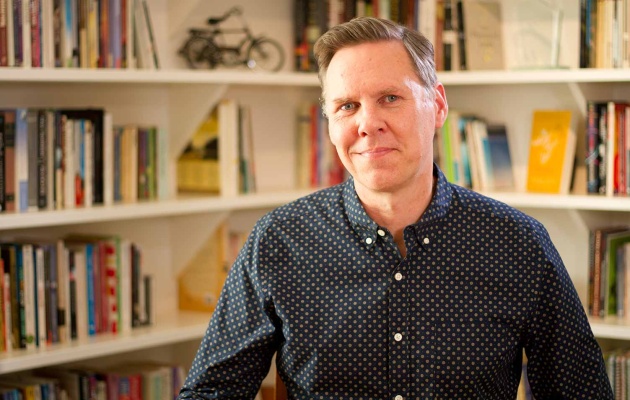One in four have no close friends, statistics say. Christian communicator Sheridan Voysey encourages Europeans to answer a survey that will shape a pioneer “Friendship Lab”.
![Making friends is often not something natural for adults. / Photo: [link]Anna Vander Stel[/link], Unsplash, CC0.](https://cms.evangelicalfocus.com/upload/imagenes/63cf9cda63512_anna-vander-stel-zimQNLdnKp0-unsplashCropped.jpg) Making friends is often not something natural for adults. / Photo: [link]Anna Vander Stel[/link], Unsplash, CC0.
Making friends is often not something natural for adults. / Photo: [link]Anna Vander Stel[/link], Unsplash, CC0.
“Popular culture focuses on romance and sexual relationships, while in church we focus on family and serving others. And so, friendship ends up getting ignored by both society and church”, says Sheridan Voysey.
The author and speaker based in Oxford (UK) has been working on a project to bring friendships back to the forefront.
After years of reading research about the causes of loneliness and the evolution of relationships between adults, Voysey felt called to launch a “Friendship Lab”. Statistics in the UK and other Western countries show that one-in-four people have no close friends.

[photo_footer] Sheridan Voysey is author of eight books and presents Pause for Thought on BBC Radio 2. [/photo_footer] “Friendship is a superpower that has been radically overlooked in our era”, says Voysey, but “friend-making is a skill no one teaches us, leading many to leave it to chance”.
Voysey’s project includes research-based courses, a podcast, media campaigns, as well as arts and education collaborations”.
A survey has been made available online to get a “more detailed sense of the problem”. The answers will help “clarify the main barriers to friendship” and significantly shape the project.
Click here to answer the survey.
“I’m especially keen to hear from Europeans”, Voysey told Evangelical Focus. “We’re wanting to make sure we’re scratching where people are itching”.
Question. In the last years, what has made building good friendships more difficult?
Answer. There are many factors at play. Research consistently finds the main culprit is busyness, whether that’s because we’re working long hours, having to make long commutes, or transporting our children to so many extra-curricular activities that we have little time and energy left for friends.
[destacate] “Shyness, social media mediated relationships, the post-pandemic effects of social isolation - all have a role to play”[/destacate]We’re also a highly mobile generation, with many of us moving cities and countries for work and other opportunities, which can disrupt friendship greatly.
A lack of trust also comes out in the research, perhaps because previous friends have let us down or even betrayed us, while other factors like shyness, the way social media is training us to mediate our relationships via screens, to the post-pandemic effects of social isolation and at-home working also have a role to play.
But a simple reason why friendship is more difficult for us is that we don’t recognise it for the foundational relationship it is. We have Sex Education in schools but no Friendship Education. We celebrate Valentine’s Day but not International Friendship Day. Popular culture focuses on romance and sexual relationships, while in church we focus on family and serving others. And so friendship ends up getting ignored by both society and church.
Q. What do you plan to do with the answers of the survey?
A. Having spent the last three years immersed in the academic literature, plus talking to hundreds of people about their relationships and crafting the evidence-based Friendship Lab Course, we’re wanting to make sure we’re scratching where people are itching. The results of this survey will help us ensure we’re putting the right amount of time on the key skills needed, and will inform the podcast and other projects we’re planning. I’m especially keen to hear from Europeans to make sure we understand the barriers you face in friendship, so we can serve you well.
Q. As a Christian, why do you think friendships can make such a difference in
people’s lives?
A. As creatures made in the image of God, we are relational to the core. That is why loneliness feels so wrong, close relationships feel so right, and why physical, mental and spiritual health have all been found to improve when we have flourishing friendships.
[destacate] “We have Sex Ed in schools but no Friendship Education”
[/destacate]Author Noreena Hertz has described our era as the ‘lonely century’ and I believe that churches are key sources of help for this problem, being one of the few institutions left that draw people of different demographic, cultural, and economic backgrounds together. With the right tools we can help a lonely world connect, being good news to our communities, and giving them a taste of life with God in the process.
Q. Tell us something more about the course.
A. When it’s released, the Friendship Lab Course will be available in various forms—for individuals to do online, for churches to run in their communities, for workplaces, sporting and other community groups, and more.
We will run pilot courses soon, have academics ready to assess their impact, and a waiting list of organisations wanting to partner with us. It’s all very exciting, and I’d covet your prayers as we start this venture well.
Learn more details about the project here.
[donate]

Las opiniones vertidas por nuestros colaboradores se realizan a nivel personal, pudiendo coincidir o no con la postura de la dirección de Protestante Digital.
Si quieres comentar o